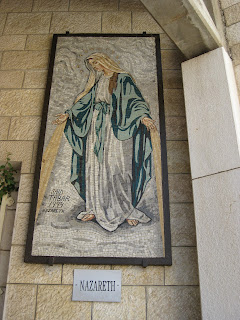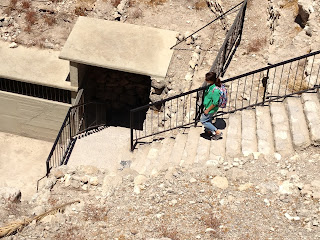In The Way of the Lord,
Tom Wright says about The Way to Jerusalem: The
test of whether pilgrimage is genuine is therefore the question, whether you’re
prepared for God to remake you instead, lovingly to break the brittle ‘you’
that you’ve so carefully constructed, to soften the clay in his hands until it’s
ready to be remoulded, and then to make out of you what he had in mind all
along, which may be quite different from what you wanted or expected. Jerusalem
is a symbol of God’s great expectations, which will by no means coincide with
our own. The only true way to go on pilgrimage to Jerusalem is to go, like
Abraham, not knowing where you are going, or who it is that you will meet when
you get there; to suspend a clinging and anxious belief as well as a skeptical
unbelief, and simply to be: to be open, to be still, to wait in silence for the
strange God who still comes to those who wait in silence. The road to Jerusalem
stands for the deeply inviting, yet deeply threatening, journey into the
presence of the one true God, where all is known and all is unknown, where all
is asked and all is promised. And that, whether or not we ever make the
geographical journey to Jerusalem itself, is the pilgrimage to which we are all
summoned.
On the first day of my pilgrimage to the Holy Land, I asked
the Lord to reveal to me an area that had become a stronghold in my life,
something that was hindering my worship of and walk with him. Through that
prayer, I became aware of an area where I cycled into unbelief with regards to
His activity in a particular area of my life. It was at Capernaum, standing
over the site where Peter’s mother-in-law was healed, that I met with God in
prayer and asked him to heal my unbelief with regards to this particular
circumstance. Over the course of the next few days and since returning home, I
have experienced a change in my thoughts,
prayers and hopes with regards to the area in which I formerly lacked true
belief in His willingness and timing. Quite some time ago, the words from Hosea
2:14-15 leapt off the pages of my Bible as if the Lord were speaking directly
to me:
behold,
I will allure her,
and bring her into the wilderness,
and speak tenderly to her.
And there I will give her her vineyards
and make the Valley of Achor a door of hope.
And there she shall answer as in the days of her youth,
as at the time when she came out of the land of Egypt.
and bring her into the wilderness,
and speak tenderly to her.
And there I will give her her vineyards
and make the Valley of Achor a door of hope.
And there she shall answer as in the days of her youth,
as at the time when she came out of the land of Egypt.
I had no idea what type of “wilderness”
experience would follow or how the Lord would lead me through it, but He has
tenderly spoken to me through every stage and I have sensed His gentle leading.
I enjoy how Tom Wright explains: every
Christian goes through cycles of discovering God, adoring God,
institutionalizing God, domesticating God, denying God, and then, please God,
rediscovering God again…God cannot be contained or imprisoned, and will always
break out elsewhere and do things we didn’t expect.
I can honestly attest to the cycles described and am encouraged by what he goes on to say: those who are truly learning the pilgrim way learn to listen, in scripture and sacrament, in silence and in suffering, for the voice of the one who loves them more deeply than they love themselves, and who therefore must ask us the questions we have not dared to face, and must ask of us that which we would rather not give.
And so it was a physical pilgrimage that
brought me to a spacious place of letting go and fully trusting Him and it is a
spiritual pilgrimage in my heart that continues to draw me nearer to the side
of Christ where He reveals, heals, forgives and changes me to love Him more.
As
the deer pants for flowing streams, so pants my soul for you, God. My soul
thirsts for God, for the living God. – Psalm 42:1-2
It was in Jerusalem, stop the Mount of Olives, where Jesus taught the disciples how to pray. Coming down from the Mount of Olives, Jesus wept over the city of Jerusalem (Luke 19:41-44)
The Jewish Cemetery
They place stones instead of flowers on graves when they have visited.
The Christian Cemetery.






















































